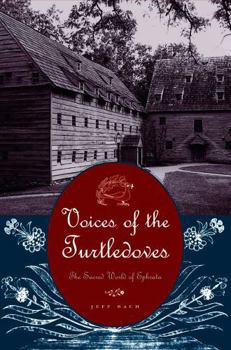Voices of the Turtledoves: The Sacred World of Ephrata
(Part of the Pennsylvania German History and Culture Series)
Select Format
Select Condition 
Book Overview
Winner, 2004 Dale W. Brown Book Award for Outstanding Scholarship in Anabaptist and Pietist StudiesWinner, 2005 Outstanding Publication, Communal Studies AssociationCo-published with the Pennsylvania German Society/Vandenhoeck & Ruprecht "Although dozens, if not hundreds, of books and articles have previously told Ephrata's story and attempted to plumb its mystical theology, Jeff Bach's is the first book to do the job comprehensively, empathetically, and accurately. . . . This book will be the standard work on the subject for decades to come, and it constitutes an important contribution to scholarship in American religious history and the history of intentional communities." -Timothy Miller, The Journal of American History "For the serious student of colonial Pennsylvania, the Brethren movement, communal societies, or Pietism in early America, Bach's work is essential reading." -David B. Eller, The Pennsylvania Magazine of History and Biography The Ephrata Cloister was a community of radical Pietists founded by Georg Conrad Beissel (1691-1768), a charismatic mystic who had been a journeyman baker in Europe. In 1720 he and a few companions sought a new life in William Penn's land of religious freedom, eventually settling on the banks of the Cocalico Creek in what is now Lancaster County. They called their community "Ephrata," after the Hebrew name for the area around Bethlehem. Voices of the Turtledoves is a fascinating look at the sacred world that flourished at Ephrata. In Voices of the Turtledoves, Jeff Bach is the first to draw extensively on Ephrata's manuscript resources and on recent archaeological investigations to present an overarching look at the community. He concludes that the key to understanding all the various aspects of life at Ephrata-its architecture, manuscript art, and social organization-is the religious thought of Beissel and his co-leaders.
Format:Paperback
Language:English
ISBN:0271027444
ISBN13:9780271027449
Release Date:March 2006
Publisher:Penn State University Press
Length:304 Pages
Weight:1.05 lbs.
Dimensions:0.8" x 6.0" x 8.8"
Customer Reviews
2 ratings
Early American Protestant Theosophic Monasticism
Published by Thriftbooks.com User , 15 years ago
According to Bach in his introduction: "This book investigates the eighteenth-century Sabbatarian monastic community at Ephrata through their religious language and its European sources as the primary, but not sole, avenue of interpretation. This book proposes that Conrad Beissel and others at Ephrata used familiar elements from German Radical Pietism to create a language and ritual practices to convey a mystical awareness of God." The book's title is taken from the idea that "many people at Ephrata sought to be united with Christ in mystical union, like the turtledoves frequently found in pairs in Ephrata's art" and "the writing gave voice to Ephrata's language for the quest of each soul to be joined to Christ, like a pair of turtledoves." I visited the Ephrata Cloister earlier this month (10/6/2009). Bach's fascinating book made the visit more meaningful and provided information not available through the site's museum and tour. My interest in the site and its history coincides with my study of the esoteric/mystical tradition of Christian theosophy, especially its development through the German mystic Jacob Boehme and his followers. It was through Arthur Versluis' books that I was introduced to the tradition as an "esoteric" form of Christianity, although I was familiar with Boehme and other theosophers influenced by him such as William Law because of my extensive study of Christian mysticism. Versluis discusses Conrad Beissel and references Bach's earlier 1997 Ph.D. Dissertation that became this book in his own book, Wisdom's Children: A Christian Esoteric Tradition, calling it "an excellent contemporary resource". Bach's book gives significantly more details and shows how Beissel was influenced by Boehme's thought primarily through Johann Georg Gichtel's interpretation of it. Beissel also held beliefs such as universal restorationism which were in common with theosopher Jane Leade and her Philadelphian Society (located in England). The ideological context of German Radical Pietism in which Beissel and his Cloister falls is also well discussed. Bach covers not only Beissel's thought, but also the religious thought of other writers at Ephrata such as Johannes Hildebrand and Ezechiel Sangmeister, the latter being adversarial in some ways to Beissel. Bach carefully sticks with the historical facts, not being automatically swayed by negative opinions such as those by Sangmeister while clearly stating and assessing them. He is also concerned to warn readers that most of the secondary literature related to Beissel and his Cloister "depends too uncritically on Julius F. Sache's two-volume history, The German Sectarians of Pennsylvania: A Critical and Legendary History of the Ephrata Cloister and the Dunkers". He points out areas of unreliability throughout his book, although he admits that Sache's text is "valuable for its preservation of much source material" apart from Sache's altering some of it to suit his own purposes (see his cau
Doesn't get much better than this!
Published by Thriftbooks.com User , 19 years ago
Not only does the author know his material, but he has a wonderful prose style as well. Highly recommend this to anyone interested in this community. Actually, I'd recommend it even if you weren't all that interested. The subject of Ephrata can either be terribly dry (to be expected of academia) or esoteric (Ephrata has a kind of "Burning Man" appeal among certain circles). The author brings the community to life and gives us a unique and penetrating glance into one of American History's best kept secrets.





